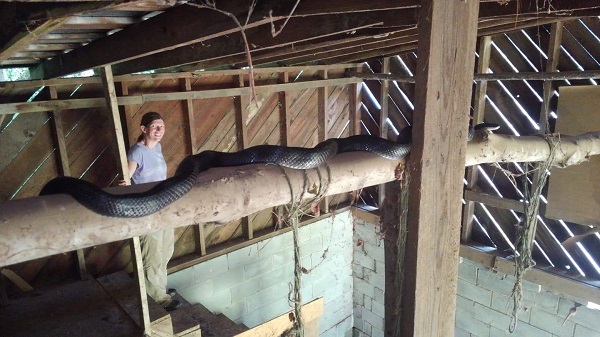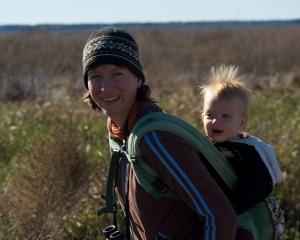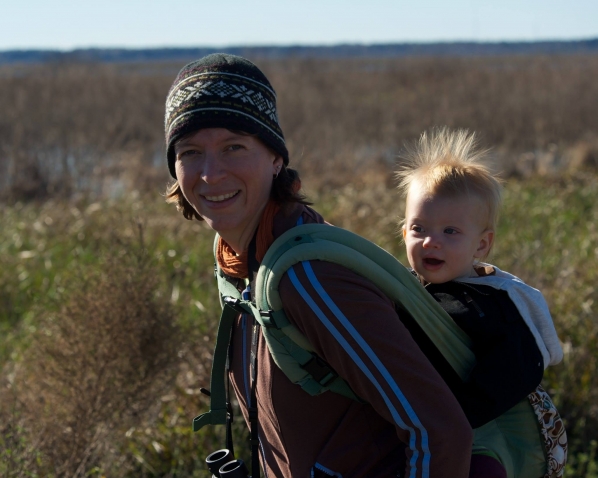Why did you become a biologist (and specifically the type of biologist you are)?
Growing up, I spent a lot of time in the forest or helping out on the family’s subsistence farm. My parents passed on to me a love for growing things and an intense curiosity about the natural world. I’ve always enjoyed exploring the Appalachian forests as well as planting woody perennials and watching them grow. These interests have pretty much stayed the same. I continue to love learning about the fantastically diverse forests of this region. I also enjoy seed saving, and growing fruit trees and other plants.
When did you know this was your career choice (Discuss the process through which you ended up choosing this as a career.)?
I was always pretty certain I wanted to do something involving biology. After graduating with a biology degree, I wasn’t sure what to do next exactly. I ended up traveling far from Appalachia; I helped translocate elephants in Malawi, studied agroforestry in India and lived out of my car in Alaska. I had a fantastic time, but at the end of it all, I realized that Appalachia is home. The diverse flora of this area is the thing that gets me most excited and gives me the most peace. It’s the beauty of this place that made me want to be a biologist. I am so glad to be here and to share the amazing biology of Appalachia with students, colleagues, friends, and family.
Who or what is your inspiration?
My kids are awesome. When we go walking in the woods they help me remember to stop and be amazed by the details.
I love and am inspired by the amazing group of people in the community that I’ve had the opportunity to work with. Through our efforts with seed saving, I’ve gotten to know people who have saved seeds for generations and people who are excited about learning. Its inspiring to see the community that comes together over this common interest.
I also just reread Pilgrim at Tinker Creek by Annie Dillard which has sent me on a serious philosophical kick about the natural world.
If you had to do it again, what would you be?
I wouldn't trade this for anything. I get to save seeds, mess around in creeks, and talk about trees! – best job ever!
What courses do you currently teach?
I currently teach Dendrology (Bio 3545), Environmental Studies (Bio 3312) and Ecology Lab (Bio 3302).
Are you planning to teach any new courses in the near future?
Dendrology (tree identification) is a relatively new fall semester course with a lecture and lab. Students learn to identify the diverse woody species of Southern Appalachia. The course also includes forest measurements and an overview of forest ecology.
I will also teach a Garden Practicum Course in Sustainable Development this summer. This is a hands-on course based in the gardens on campus and focusing on community garden management
What do you like most about teaching?
I really enjoy sharing my excitement for the natural world with my students. There is nothing better than hiking through the woods with a group of students and sharing knowledge that can increase their depth of understanding of the fantastic ecosystems of Southern Appalachia.
What is the overarching goal of your research (service) program?
Community Seed Library and other work with Blue Ridge Women in Agriculture
Over the past couple years, I have worked on the board and as a volunteer with Blue Ridge Women in Agriculture (BRWIA). BRWIA manages the Food Hub (an online farmer’s market), as well as the King St Market and the Winter Farmer’s Markets. Our mission is to build an equitable sustainable High Country Local food system by supporting producers and cultivating community connections.
Part of the work that I have focused on has involved working with the Watauga and Ashe County Public Libraries to create seed libraries for community members in the high country. We have gathered seeds from community gardens, individuals, local businesses and seed companies, divide them and make them available for free to anyone in the community. The seed library was accessed over 300 times in the first year.
We hope to promote and preserve the wide genetic diversity of seeds adapted to our area that may have traits important for climate change and disease resistance. We also aim to promote gardening and food security by providing free open-pollinated and heirloom seeds and encouraging seed saving among community members.
What advice do you have for undergraduates/graduates pursuing degrees in biology these days (or advice on how to be a successful student at App State?)
Work hard and love what you do.
Is there anything else you'd like us to know about you?
If you are interested in learning more about BRWIA, you can see their website here. If you want to get involved, please contact me.

Julia and a little friend.

